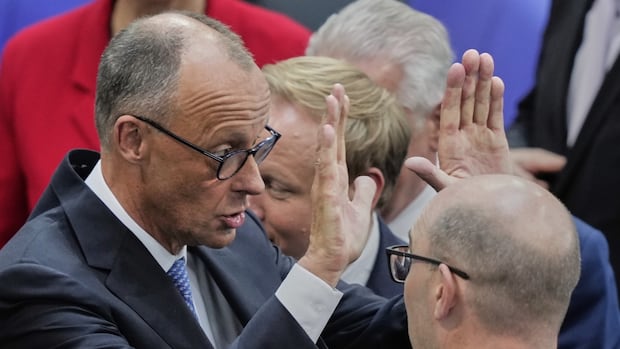Friedrich Merz succeeded Tuesday in his bid to become the next German chancellor during a second vote in parliament, hours after he suffered a historic defeat in the first round.
A candidate for chancellor had never failed to win on the first ballot since the end of the Second World War. The loss triggered a stock market slide: the DAX, the index of major German companies, was down 1.8 per cent following the first vote.
But Johann Wadephul, the designated next foreign minister, predicted after the first vote that Merz would ultimately prevail.
“It is an annoying process, but in a parliamentary democracy, in a liberal country, this is unfortunately one of the scenarios that you have to be prepared for,” he told reporters.
Merz received 325 votes in the second ballot in the 630-seat Bundestag. Nine lawmakers abstained on the first round, said Julia Kloeckner, president of Germany’s lower house of parliament, as Merz fell short with 310 votes.
Merz’s coalition, formed after an election in February, is led by his centre-right Christian Democratic Union (CDU). They are joined by Bavarian sister party, the Christian Social Union, and the centre-left Social Democrats, outgoing chancellor Olaf Scholz’s party.
Germany is set to participate in a host of summits next month, involving the European Union in Brussels, NATO at the Hague, Netherlands, and the Canada-hosted G7 summit in Kananaskis, Alta., between June 15-17.
‘Europe needs a strong Germany’
Germany is the second-biggest supplier of military aid to Ukraine after the United States, and in defence spending, it ranks fourth in the world, according to the Stockholm International Peace Research Institute, which studies trends in global military expenditures.
“The world is in turmoil. Europe needs a strong Germany,” Carsten Linnemann, the secretary general of the Christian Democrats, told reporters after Merz’s first-ballot defeat.

Germany has the continent’s biggest economy and serves as a diplomatic heavyweight. The new chancellor’s portfolio would include the war in Ukraine and the Donald Trump administration’s trade policy on top of domestic issues, such as Germany’s stagnant economy and the rise of a far-right, anti-immigrant party.
Merz, 69, offered surprisingly blunt comments about the state of the relationship with the U.S. after February’s election, saying, “it is clear that the Americans, at least this part of the Americans, this administration, are largely indifferent to the fate of Europe.”
Besides ramping up defence spending, Merz’s coalition has pledged to spur economic growth, take a tougher approach to migration and catch up on long-neglected modernization.
Volker Resing, who wrote the recent biography Friedrich Merz: His Path to Power, expressed surprise at the turn of events.
“It shows how fragile the coalition’s situation is and that some lawmakers are prepared to spread uncertainty — that’s a warning signal,” Resing told The Associated Press.
Far-right AfD pans ‘weak’ coalition
Alice Weidel, co-leader of the far-right, anti-immigrant Alternative for Germany party, slammed Merz’s failure as proof that his coalition has a “weak foundation.”
AfD is the biggest opposition party in Germany’s new parliament after it placed second in the February elections. Despite its historic gains, it was shut out of coalition talks due to the so-called “firewall” that mainstream German political parties have upheld against co-operating with far-right parties since the end of the war.
Last week, the German domestic intelligence service said it has classified AfD as a “right-wing extremist” organization, making it subject to greater and broader surveillance.
The domestic intelligence service’s measure does not amount to a ban of the party, which can only take place through a request by either of parliament’s two chambers, or the federal government through the Federal Constitutional Court.
Germany elected Friedrich Merz’s conservative Christian Democratic Union (CDU) in Sunday’s snap election, but the far-right Alternative for Germany (AfD) are celebrating a record second-place result. Andrew Chang breaks down the makeup of the new coalition government the CDU will need to form, and the significance of the AfD’s gains.
Images supplied by Reuters, Getty Images and the Canadian Press.
Merz has not commented publicly on the intelligence service’s decision.
The U.S. administration has bashed Germany repeatedly since Trump’s inauguration in January. Trump, who has German roots, had often expressed his dislike of former chancellor Angela Merkel — who led the CDU — during his first term in office.
U.S. Vice-President JD Vance, during the Munich Security Conference in February, assailed the “firewall” and later met with Weidel, instead of Germany’s leader, Scholz.
As well, Trump ally Elon Musk hosted a chat with Weidel that he livestreamed on X earlier this year to amplify her party’s message.

